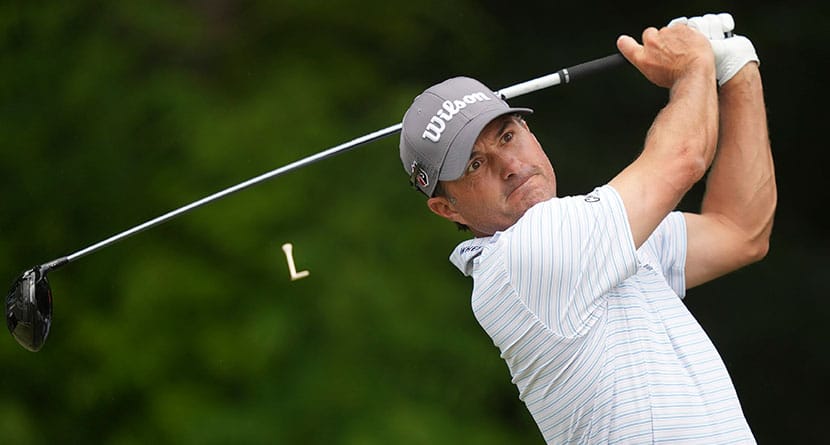Kevin Kisner is no stranger to bad golf.
It was a struggle when he left a championship career behind at Georgia, taking four years through some of golf’s back roads to get on the PGA Tour. Even after he secured his tour card for the third time, his game felt so bad he wanted to quit.
But there’s one difference now.
“I’d never gotten to where I was 39 years old with three kids,” Kisner said Monday evening as he waited to catch a cross-country flight to resume a career that sure feels like hard work.
This ain’t no hobby, as Kisner is famous for saying.
“There have been times golf has been that way, but not after having so much success, and then your family is asking where you are and you see the results you’re getting.”
It was bad enough to walk away, and so he did.
Kisner was 7-over par through nine holes at the Travelers Championship on June 22 when he withdrew and headed home to South Carolina.
“I was in a weird spot,” Kisner said. “I was playing so bad. I didn’t want to be on the road by myself, missing out on my wife and kids’ activities — missing out on life. I was traveling by myself and wanting to be home, and then playing poor golf. And it was spiraling out of control.”
He makes his return Thursday in the Fortinet Championship in Napa, California, although he’s not ready to call it a comeback. These are baby steps from going 84 days without competition, and only getting after it three weeks ago with longtime coach John Tillery.
Nine months ago, Kisner was No. 31 in the world and had played on his second Presidents Cup team. That can feel like a long way off for a guy now at No. 112 in the world and out of the top 200 in the FedEx Cup for the first time in his career.
Tillery is who first got him on track a decade ago, leading Kisner to pile up nearly $30 million in career earnings, four wins and eight consecutive years (minus three weeks) inside the top 50 in the world.
Kisner also reached out to another source for help — Steve Stricker.
Stricker went into a slump so severe some 20 years ago that he won the PGA Tour comeback player of the year award in back-to-back years.
He finished outside the top 150 on the money list three straight years and then slowly rebuilt his game. He spent a Wisconsin winter in 2005 hitting balls from a heated trailer out to a frozen field. Two years later, he was among the elite in golf again.
“He just wanted to know what I went through,” Stricker said. “It seems like a lot of guys at some point in their career come across this. They start to play bad and wonder if they should be doing this, or if they should be at home if they have young kids.
“Really, the biggest thing is don’t come out until you’re ready, until you feel good about your game and being there mentally,” he said. “It’s important not to continue going down a bad path, going out there because you feel you had to.”
Kisner said his path took a turn for the worse a year ago as the regular season was ending. He hit the ball awfully, and then spent the next two weeks of the FedEx Cup playoffs trying to patch together his game with little success. At the Presidents Cup, he played three matches and went 0-2-1.
He decided to seek out other coaches to see what they could offer, and all that gave him was too many swing thoughts. He got back together with Tillery a week before the PGA Championship and a month later felt his best way forward was to step away.
One nugget he picked up from Stricker was not having to compete every week to find his way back. The idea is to play, figure out what needs work and keep grinding at home.
“I’m just going to follow Stricker’s playbook,” Kisner said.
Of course, that script would mean giving up hunting season to hit balls with a foot of snow on the ground, and that’s not likely to happen in Aiken, South Carolina — at least the snow part.
“I’m hitting off dirt behind a nursery,” Kisner replied.
That’s not by choice. His home course, Palmetto Golf Club, is getting new grass. His other club, Sage Valley in Augusta, Georgia, is closed for the summer. Kisner has been bouncing around to whoever will take him — Aiken Golf Club, Augusta Country Club, a few trips to North Carolina.
Now it’s back to the real thing at the Fortinet Championship. This no longer is the start of a new PGA Tour season, rather a seven-tournament fall schedule mainly for players to keep their cards (Kisner is still exempt) or land one of the 10 spots available for two of the $20 million signature events next year.
Kisner doesn’t plan on playing more than three times — testing his game and going back home to shore up the parts that are lacking.
Stricker went six weeks between PGA Tour starts in 2006 when he finished third in Houston, the turning point of his comeback.
“My wife says I should have tons of patience left because I haven’t used any,” Kisner said. “Going into the week, the competitor in you wants to win. You’ve put the work in. You’ve put the time in. Your body knows how to do it. But I’ve got to learn to stick to the plan so next December you’re calling me because I’ve won four times in 2024.”




